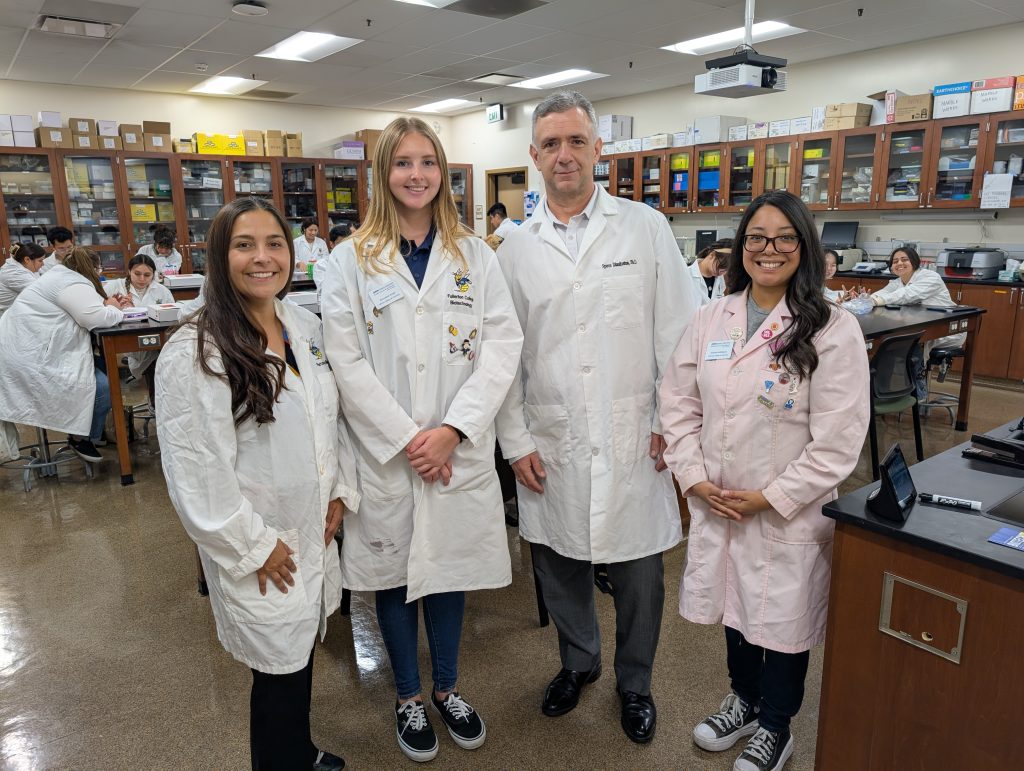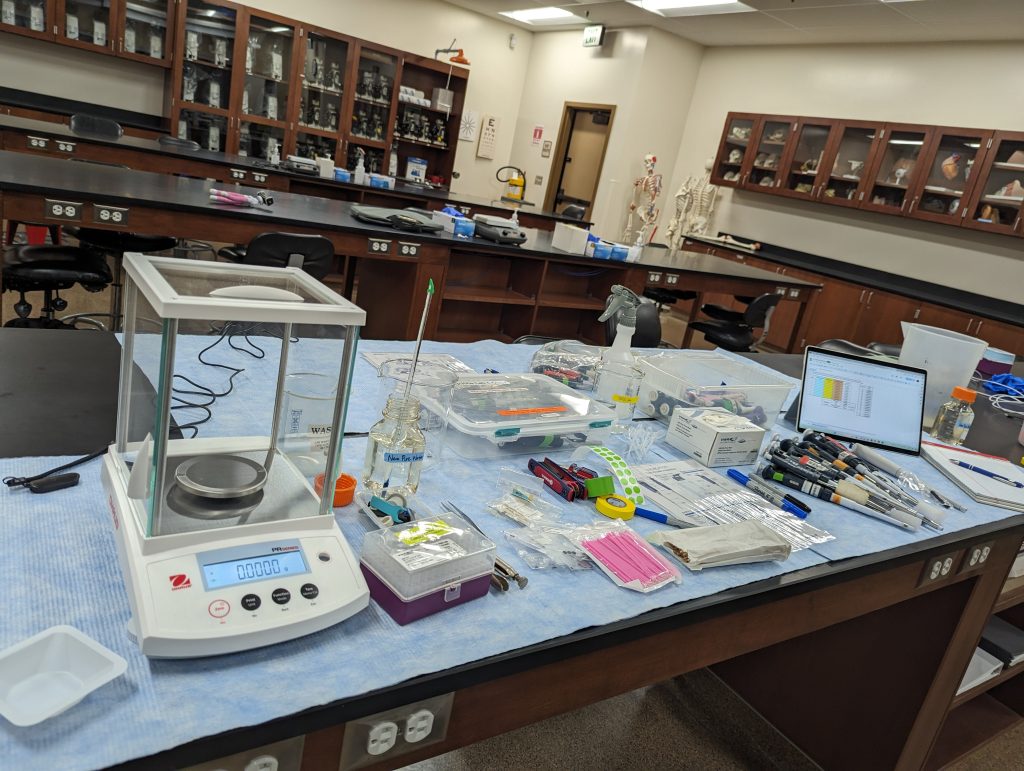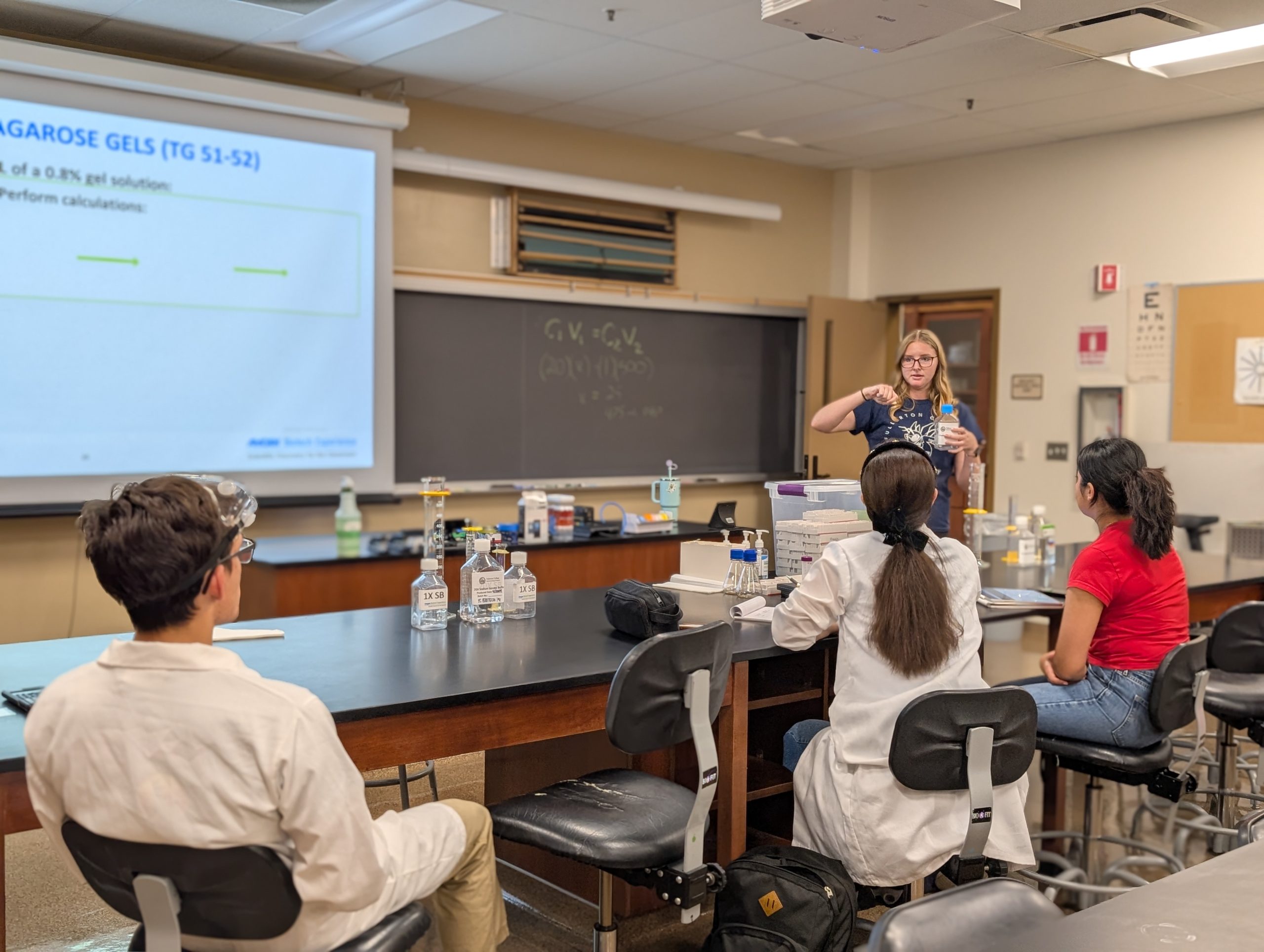Amgen Biotech Experience Internship Prepares Future Science Leaders
The Natural Sciences Division’s partnership with the Amgen Biotech Experience (ABE) program is committed to preparing students to achieve their goals and land the career of their dreams. A proud partner of Fullerton College’s Biotechnology Program, the ABE internship is designed to cultivate hands-on biotechnology experience for students, professional lab skills and a deeper understanding of the field. The internship is operated by ABE Center Coordinator and Lab Technician II Gladys Rodriguez and Lab Technician Kennedie Doyle with the support of biotechnology professors, Dr. Kimberly Rosales and Dr. Spiridon Dimitratos.

“Our interns learn extensive hands-on techniques that are normally taught in 4-year or university level classrooms, with opportunities to learn additional upper-level methods and procedures. The internship allows students to get introductory level hands-on experience and more importantly, work with others to set learning goals through the Biotech Internship class. Every workday scheduled, students learn new techniques and or work toward their goals,” said Rodriguez.
The Amgen Biotech Experience Program has seven distribution centers where high school science teachers can pick up lab equipment, materials and more. One of these seven distribution centers is located in the Division of Natural Sciences, specifically in the Biology Department, a space of opportunity, possibility and hands-on learning.

Raneem Shawar, a first-year biochemistry major at California State University, Long Beach (CSULB), greatly benefited from the internship’s teachings during the fall 2024 semester. At Fullerton College, Shawar is also a part-time student currently working on her Biotechnology Lab Technician Certification. Her unique journey as a student at two different campuses speaks to FC Biotech Program’s flexibility to ensure students are able to gain these critical lab skills despite their busy schedules.
“The internship was my first time working in a professional lab and taught me a lot of things that are benefitting me now. It confirmed for me that I want to work in a lab. I was able to hone skills I already learned, such as micropipetting and chromatography,” said Shawar. “Overall, the internship taught me good discipline and allowed me a space to learn what working in a laboratory was like whilst being supported by the incredible staff at Fullerton College. It was a factor in my decision to return to Fullerton College to earn a biotech certificate.”
Once she graduates from Fullerton College and CSULB, Shawar plans to venture to graduate school for a PhD in human genetics. She is also passionate about research surrounding hereditary diseases, with the possibility of teaching as well.
Having taken the Fullerton College Introduction to Biotechnology course, second-year biology major, Julia Jung, took advantage of the ABE-FC biotech program partnership this fall 2025 semester. So far, she has worked alongside three other interns to build professional skills and deepen her understanding of the lab environment. Some of her experiences include making agarose gels for running DNA sequences in buffer solutions for local high schools and colleges, hosting an annual teacher meeting to share biotechnology updates and assisting with supply distribution. The program also covered various aspects of biotechnology, including recombinant DNA techniques for protein production and forensic applications in crime investigations.
“I truly enjoy my work as an intern because it allows me to learn about the biotechnology industry, engage with the community and develop valuable lab skills,” said Jung. “I strongly believe biotechnology has the potential to bring about significant advancements in the health industry and making real differences in people’s lives.”
Jung’s academic goals include transferring to a University of California campus to pursue her bachelor’s and master’s degrees in pharmaceutical sciences.
She also hopes to one day help patients at all levels by developing new, effective medicines that improve both quality of life and longevity by using the skills, education and training gained through the ABE program.
Students that participate in the ABE internship are required to enroll in the internship course BIOL 297 to receive college credit. Interns work on many different tasks such as Quality Control “QC” of equipment and reagents, assist the preparation of materials going out, aid in teacher training and more.
Faculty have worked to highlight the partnership in their own curriculum. Dr. Dimitratos’ Biotech 191L class, for instance, participates in “Production Workdays” where students learn and produce lab products like agar plates and 0.8% agarose gels used by local high schools and other biotechnology classes on campus.
Dr. Rosales also incorporates some of the ABE curriculum in her classroom, giving students the chance to work with recombinant DNA and the transformation of bacterial cells.
Because of this amazing partnership, the ABE internship at Fullerton College preferentially seeks students pursuing a certificate or degree from the FC Biotechnology Program but also welcomes any student with a passion for learning hands-on laboratory skills.
With over 30 years of service, the ABE program serves over 18,000 students in six different counties annually. The program also offers a complete curriculum with a menu of four different lab series so teachers can customize their classes. The program provides professional teacher training, equipment and supplies for classroom use, supportive resources and ongoing technical support at no cost.
Learn more about the ABE program by visiting the regional website. To learn more about the opportunities, experiences and certificates offered by the Biotechnology program visit the Biotechnology Program’s website.






